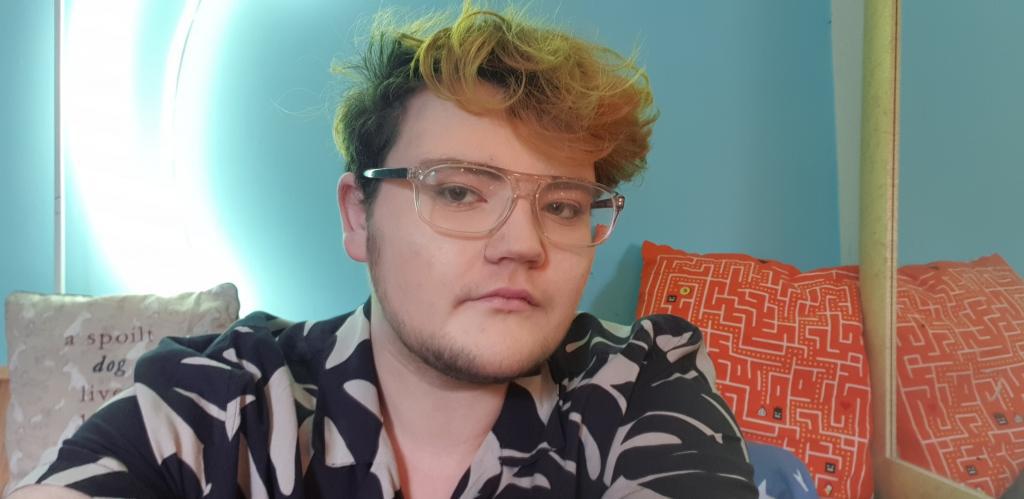In my bedroom on Saturday March 27th, I blinked at the now all-too-familiar 'Please wait for the host to start the meeting' Zoom window – muttering a rehearsal of my prepared questions.
The meeting started with the audio descriptor explaining how we looked. Me, in Belfast, with a blue wall behind me and a smiley face tapestry; Sophie, in London, sat on a white chair next to a plant and a mirror; and Keely, in Hollywood, on a black chair in front of a poster.
I introduced myself: Kit Rees, illustration student with a passion for body positivity, LGBTQ+ rights, and sustainability. I disclosed that while not a part of the disabled community myself, I experience chronic illness.

Kit Rees, Illustrator and arts facilitator
Next, Sophie Morgan introduced herself, explaining that she works as a TV presenter as well as a consultant and portrait artist. She announced that she was working on a book about her life that would be released soon as well as hinting at an upcoming television project put on hold due to the pandemic.
Then Keely Cat-Wells, told us about her work as an actor, and entrepreneur, introducing us to her companies C Talent and Zetta Studios.
I am a student, just beginning to break into the industry myself, so I was curious how each of the panelists were able to turn their hobbies into a career. Like me, Sophie explained that she studied visual arts at university and went on to set up her own illustration company “Love Lines”. However after this, she started finding opportunities in the entertainment industry, as a presenter and consultant. She continues to work on television as well as consulting companies on how they can make their services more accessible for their customers with disabilities.
Keely shared that she had spent her youth immersed in creative industries and trained in school to become a dancer. Unfortunately, she was unable to pursue dance after her health took a turn. While in the hospital, she began working as an agent for her friends who danced, and formed her company 'C Talent', specializing in agency for d/Deaf and Disabled artists and athletes.
We spoke about the current state of the creative industries in respect of attitudes towards disability. Sophie expressed that many consider diversity to be 'on trend' right now, leading to more visibility than ever before. Keely emphasized her belief in the need for intersectionality in disabled roles. We griped that most disabled characters in television are white, cisgender, heterosexual men in wheelchairs. This is a very two-dimensional depiction of the disabled community which, in reality, contains infinite diversity.

Keely Cat-Wells and Sophie Morgan
The disabled community is tired, said Sophie, of their stories being used simply as “inspiration”. A disabled person’s story is often told solely to inspire and motivate able-bodied people in an often exploitative or patronizing way. Sophie considered it a 'dangerous trope' that many characters with disabilities fall into.
I asked the pair how they think the industry needs to change in order to better include the disabled community. Keely shared her view that, for change to happen, people with disabilities need to be hired behind the camera as well as in front. She urged studios to hire people with disabilities to write, produce, and edit their own stories. Sophie added that companies should consider hiring disability consultants – a role both her and Keely have stepped into at times.
An audience member reported that they had been turned down from jobs for their disability, that they were told it was too expensive to make an accessible space. While this is disheartening to hear, Keely informed us this is not uncommon, despite it not actually being that costly to ensure access to those with disabilities. Even if it is out of one’s budget to make their space accessible, there are government grants and organizations dedicated to helping make the world more open to the disabled community. Keely revealed that she intends to open the first fully accessible film studio – 'Zetta Studios'. The point was made that by making a space inaccessible, you are essentially saying you do not welcome a fifth of the population. She explained that making a space accessible for those with disabilities benefits everyone – she made the example that on a film set, the same ramp a wheelchair uses, is also used by people transporting trolleys of equipment.
The audience asked, when interviewing for jobs how can you show that you are as capable as your able-bodied competition. Sophie explained that she felt that her disability gave her a unique perspective that is valued by employers. She shared that she believed it helped her break into the creative industries and afforded her opportunities presenting television about disabilities such as the Paralympics. I added that I believe in working not despite your challenges but because of them.
I asked the pair what they thought about how we are taught about disability. We agreed that more needs to be done and that it is our responsibility to educate ourselves, rather than putting the onus on every person with disabilities we meet to teach us. Keely yearned for more education for employers, as finding an accessible workplace can be difficult. To prompt the others, I wondered if they could recommend any educational resources. Sophie cheered, 'That’s what the internet’s for!' while Keely directed us to the resources page on her website.
I was so engrossed in our discussion that I let time run away! Noticing the clock hit 5, I thanked the participants for their time and knowledge and ended the call. I knew my next task was to research my industry, and how I can best be an ally to those with disabilities.
Find out more about:

